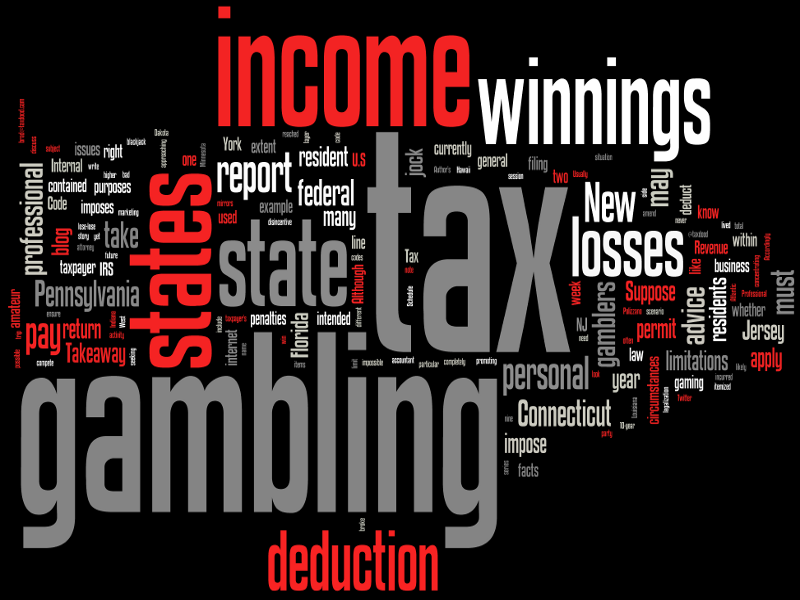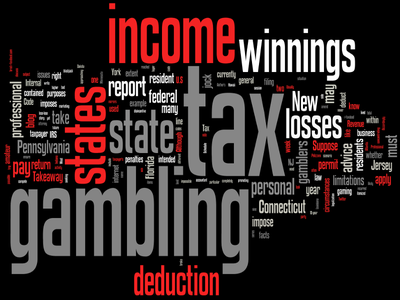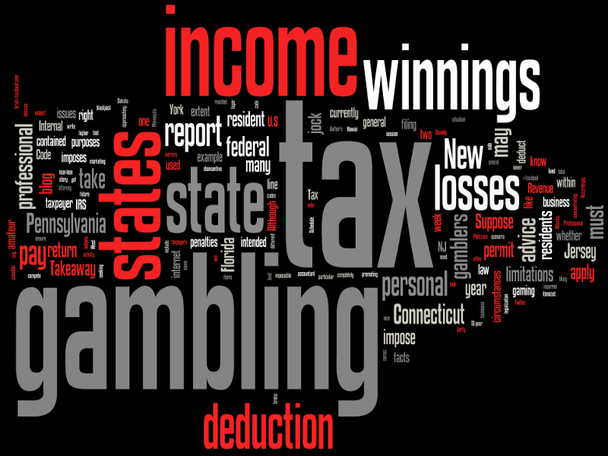


We’ve covered a lot of content over the past two months. To this point, the series has focused on federal law. This week we take a look at some state tax issues.
Each U.S. state has its own tax code. Not all states, however, impose a personal income tax. Seven do not: Alaska, Florida, Nevada, South Dakota, Texas, Washington, and Wyoming. New Hampshire and Tennessee impose personal income tax only on dividend and interest income. Accordingly, residents of these nine states do not have to pay to their state income tax on gambling winnings. That leaves forty-one states with a general personal income tax.
Takeaway #1: In general, a state that imposes a personal income tax levies a tax on gambling winnings of its residents.
This rule mirrors application of the federal tax law to gambling winnings. Be sure to check your own state’s specific rules, though, as there are exceptions. In Connecticut, for example, a resident filing single need not report lottery winnings to the state if the resident’s total gross income from the year is less than $13,000.
On the deduction side for state tax purposes, it’s a different story. And not in a good way.
Takeaway #2: Some states limit the extent a taxpayer may deduct gambling losses. In fact, some states do not permit a deduction for gambling losses at all.
These limitations are beyond the limitation of deducting gambling losses under 165(d) of the Internal Revenue Code, which permits the deduction of gambling losses to the extent of gambling winnings.
Keep in mind these limitations apply only to amateur gamblers. Professional gamblers are not subject because a professional’s gambling deduction is incurred in connection with the trade or business of gambling.
Unsurprisingly, there are many tax cases in which a state tax agency challenges, often successfully, a taxpayer’s professional gambler status. A taxpayer cannot simply choose whether one is a professional or amateur; it is a facts and circumstances determination.
One state that does not permit a deduction for gambling losses is Connecticut. Suppose for the year I have $50,000 gambling winnings and $50,000 gambling losses, properly accounted for by session. On my federal income tax return, I report $50,000 of gambling winnings on line 21 as “other income,” and I report $50,000 of gambling losses as an itemized deduction on Schedule A. On my Connecticut income tax return, I must report all $50,000 of gambling winnings, yet I cannot take a $50,000 deduction for the gambling loss. Although I broke even from gambling for the year, I must pay Connecticut income tax on the $50,000 of winnings!
Other states that currently do not permit a deduction for gambling losses include Hawaii, Illinois, Indiana, Massachusetts, Michigan, Ohio, West Virginia, and Wisconsin. Some states, such as Louisiana, Minnesota, and New York, apply other limitations, but may not completely disallow the deduction.
We know many states are currently considering the legalization and regulation of either brick and mortar casinos or internet gambling, or both. What we don’t know is whether any of these “bad” states seeking to expand gambling will amend their tax codes to enable many of its future gaming patrons to deduct gambling losses on their state income tax returns. If not, then there will be a significant disincentive for profit-seeking gamblers to engage in gambling activity within such states. Seems like a potential lose-lose to me.
Takeaway #3: Some states impose income tax on gambling winnings of nonresidents who gamble within the state.
This is commonly referred to as the “jock tax.” The name originates from states taxing the income of professional athletes who travel into their state to compete. For example, I wrote a piece about how the “jock tax” may apply to baseball star Albert Pujols, who during this offseason inked a 10-year, $254 million contract to play for the Los Angeles Angels.
So how does the “jock tax” impact gamblers? Suppose you are a resident of Florida, and take a trip to Atlantic City, NJ. You win millions playing blackjack one night, like Don Johnson. Although you never lived, owned property, or conducted business in New Jersey, you must report and pay income tax on the gambling winnings to the state.
Let’s add a layer of complexity to the scenario. Suppose instead you are a resident of Pennsylvania. Unlike Florida, Pennsylvania imposes a personal income tax on its residents. Does Pennsylvania also have the right to tax the gambling winnings you won in New Jersey?
Usually, the state in which the income is earned has the first right to tax the income. While you are likely required to report the gambling winnings to both New Jersey and Pennsylvania, you may be able to take a credit on the PA return for the taxes paid to NJ. The bottom line is that you should effectively pay only the higher of the two states’ tax rates, and not pay the full tax to both states.
This year’s “Tax Day,” April 17, is approaching. Next week, we’ll cover some items associated with the filing deadline, such as extensions and possible penalties for noncompliance.
Author’s note: I must remind all readers that it is impossible to offer comprehensive tax advice on the internet. Information I write on this blog is not legal advice, and is not intended to address anyone’s particular tax situation. Should you seek such advice, consult with a tax professional to discuss your facts and circumstances.
IRS Circular 230 Notice: To ensure compliance with requirements imposed by the IRS, I inform you that any U.S. federal tax advice contained in this blog is not intended or written to be used, and cannot be used, for the purposes of (i) avoiding penalties under the Internal Revenue Code or (ii) promoting, marketing or recommending to another party any transaction or matter that is contained in this blog.

